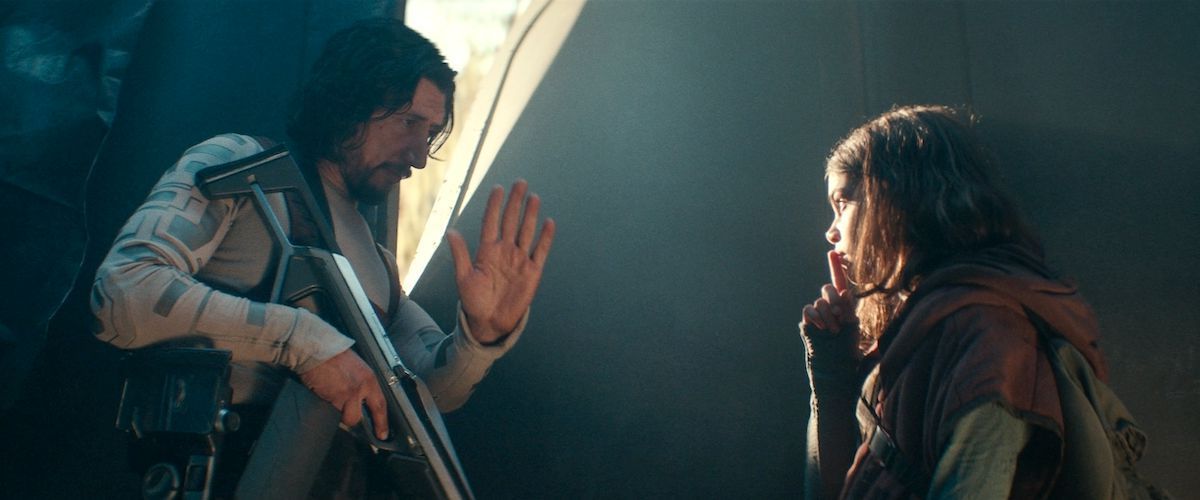Jonah Naplan April 8, 2023
I heavily debated writing a piece on “65,” because doing so would break my habit of only reviewing the films I see in a theater. But I’ve decided to start trying something different. Yes, I know my review is late. But “65” was dropped on VOD this past weekend, and I decided to watch it at home after missing it in theaters. Even so, the movie was released less than a month ago, and if it still was playing at the cinema, going to see it this late would still be fair game for a review. So I’ve made myself a new rule. If I don’t catch a movie while it’s in theaters, but I’m able to find some way to watch it after the fact—within the parameters of the first month the film is released—it’s due for a review. And you’ll probably start seeing “catch up” reviews like this one more frequently. But let’s start talking about the movie.
I didn’t really like “65.” I found it to be bland, relatively uninspired, and too derivative of the “Jurassic Park” franchise. But the film does follow a concept that’s intriguing. The movie opens with broad shots of galaxies, as a title card reading, “Prior to the advent of mankind” comes on screen. Mills (Adam Driver) is a space pilot who goes on a space exploration mission in order to afford medical care for his sick daughter, Nevine (Chloe Coleman), back at home in their family’s futuristic civilization. But on his expedition, Mills’ ship collides with an asteroid field, and crashlands on Earth, 65 million years ago. Everyone on his ship has been killed, except for a young girl named Koa (Ariana Greenblatt). Koa doesn’t speak English, so as she and Mills find themselves relying on each other for survival in this strange land, the pair use hand motions, and word mimicking in order to communicate.
We all know what was on Earth 65 million years ago. Tall forests, massive bugs, and of course, carnivorous dinosaurs. Mills and Koa find themselves hunted by these creatures, and as the plot unravels, they use their futuristic devices to ward off the critters of the Cretaceous period. Writers and directors Scott Beck and Brian Woods have previously worked on the screenplays for both “A Quiet Place” films, alongside John Krasinski. With “65,” the directors would have benefitted from looking back at their prior work, and drawing inspiration from what made those two movies so thrilling.
“65” should succeed purely as a B movie, but unfortunately it doesn’t. And it’s a film that certainly would have made a profit from being much more dumb. Think about it. This is a film featuring Adam Driver running away from vicious dinosaurs scampering towards him. He’s using his future technology to fight off the demons of the past. There are parts of “65” that fall flat because they’re played way too seriously, and just aren’t very fun.
I did not find “65” to be boring, but what it presents instead of schlock is a sappy relationship between an adult and a child—two characters who really couldn’t have less chemistry with each other. Driver is a fine actor, and when he goes for it in his performances, he’s excellent. But here he just comes off as a somewhat reluctant hero, who always seems to be annoyed. Ariana Greenblatt is also a fine young actress, and her quiet performance works. But these ingredients don’t fold together well.
I think I only counted four characters in “65.” Mills is one, Koa is two, Mills’ daughter Nevine is three (although she mainly appears through flashbacks), and Mills has a wife shown only in the opening scene—that’s four. It is a sparsely occupied film, without much dialogue, either. Maybe that’s why the movie feels so dull. It runs just barely over 90 minutes, with not a whole lot of substance to it. There is a clear objective of getting to the top of a mountain to retrieve a lost escape vessel, and the film sometimes feels like a video game as Mills and Koa encounter (and kill) the dinosaurs they find on the way. It’s a simple concept, told in very simple terms. Too simple to the point that it stops bothering to surprise us. I kept wishing it would take a risk.
Its potential to be something thrilling—along the lines of Woods and Beck’s “A Quiet Place” movies—is not fully realized. What we get instead is a movie that is not offensively bad, but one you’re frustrated wasn’t better. You’re not bored while watching the movie per se, but everything that’s happening in front of you is passing right through your retina, and then continues moving in a straight line until it dumps out through the back of your head—within seconds. In the movie, the crisis is an asteroid shower, but it’s this forgettability that becomes the global emergency.

